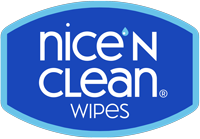Biodegradable Flushable Wipes vs. Toilet Paper: Which is Better?

When it comes to comparing flushable wipes and toilet paper, most of us are aware that moist toilet tissue is superior when it comes to cleaning and health benefits. And they always win when it comes to comfort and soothing benefits. But where flushable wipes have historically fallen short is in the environmental impact department.
But with the introduction of Nice ’N CLEAN® SecureFLUSH™ Technology Flushable Wipes, that all changes.
In this article, we compare biodegradable flushable wipes with standard toilet paper in the areas of cleansing, health, comfort, and sustainability to see which one comes out on top.
Cleansing Benefits
When it comes to cleansing, having a wet element is critical. You can’t do laundry without water. You can’t wash dishes without water. And you can’t shower without water. So why is dry toilet paper the standard when it comes to wiping our bottom?
Experts agree that some sort of moisture -- whether it be a wet wipe or a bidet -- after using the restroom is important for removing waste and bacteria.
Cleansing Winner: Biodegradable Flushable Wipes
Health Benefits
Both biodegradable flushable wipes and toilet paper remove bacteria and fecal waste from your nether regions. However, if we compare which one removes more, biodegradable flushable wipes are the clear winner. That’s because, as mentioned above, the moist cleansing formula helps remove more bacteria, dirt, and waste than dry toilet paper alone.
Health Winner: Biodegradable Flushable Wipes
Comfort Benefits
Very few people would describe wiping their bottom as a comfortable experience so we’re looking at which option is more comfortable. Nice ’N CLEAN® SecureFLUSH™ Technology Flushable Wipes are made from soft plant-based fibers that provide a gentle wiping experience. Even the softest dry toilet paper cannot beat a more cloth-like material when it comes to providing a soothing experience.
Comfort Winner: Biodegradable Flushable Wipes
Environmental Benefits
While both biodegradable flushable wipes and toilet paper are naturally biodegradable and safe for septic systems, biodegradable [1] flushable [2] wipes like Nice ’N CLEAN® SecureFLUSH™ Technology Flushable Wipes break apart in water 5 times faster than the leading toilet paper.
Standard toilet paper is made of wood pulp from virgin trees with a mix of approximately 70% hardwood and 30% softwood. While it does start breaking apart in water upon contact and will eventually decompose, the process can take anywhere from a month to several years depending on the thickness of the toilet paper and its exposure to water when it’s flushed in the toilet. Regardless, standard toilet paper takes longer to biodegrade than biodegradable flushable wipes, such as Nice ’N CLEAN® SecureFLUSH™ Technology Flushable Wipes.
Sustainability Winner: Biodegradable Flushable Wipes
ALSO READ: Flushable Wet Wipes vs. Toilet Paper: Which is Better?

You Don’t Have to Choose!
While biodegradable flushable wipes are the clear winner when it comes to cleansing, health, comfort, and sustainability, you don’t necessarily have to choose. Moist toilet tissue and dry toilet paper can be a nice complement to one another as part of your daily bathroom hygiene routine.
[1] When disposed of in the toilet
[2] Safe for well-maintained sewer and septic systems. Not recommended for use with motorhomes or basement pump systems.
References:
- https://www.independent.co.uk/life-style/toilet-paper-stop-use-wet-wipes-doctor-health-problems-bidets-a8028906.html
- https://ecofreek.com/biodegradable/is-toilet-paper-biodegradable/
- https://www.bustle.com/p/the-3-best-biodegradable-toilet-paper-18718625
- https://www.deschuteslandtrust.org/news/blog/2019-blog-posts/decomposition-organic-litter




